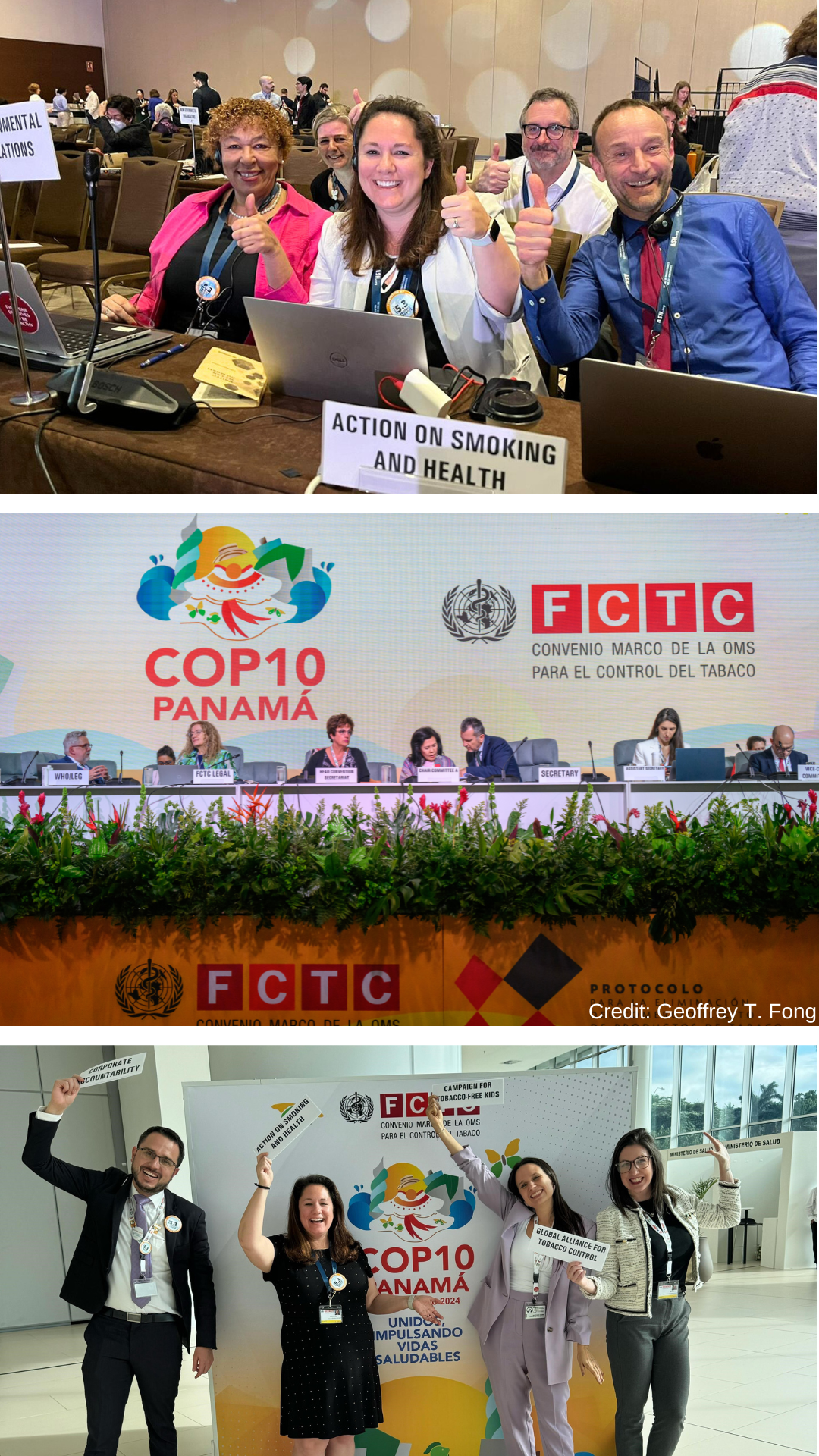The ASH Policy Team is in Panama for the Tenth Conference of the Parties (COP10) of the WHO Framework Convention on Tobacco Control (FCTC) from February 5 – 10, 2024. They will share updates and progress here for our community to stay engaged and informed throughout COP10.
 February 10, 2024 – COP10 was particularly special because several cross-cutting issues – human rights, the environment, and the tobacco endgame – were on the agenda.
February 10, 2024 – COP10 was particularly special because several cross-cutting issues – human rights, the environment, and the tobacco endgame – were on the agenda.
ASH and the Global Alliance for Tobacco Control (then the Framework Convention on Tobacco Control) led advocacy for a human rights decision at COP8 that was postponed. We’ve garnered vast support protecting the right to health since 2018 and are elated to report that the COP10 Human Rights Decision passed, thanks to strong leadership from Ecuador and support from their co-sponsors Brazil, Panama, Palau, and New Zealand.
HUMAN RIGHTS- PASSED!
Brazil was also a leader in the environmental movement to strengthen implementation of 18, along with their co-sponsors Ecuador and Panama. The Decision aligns the FCTC with the work being complete by the Intergovernmental Negotiating Committee on Plastics Pollution, including noting that the WHO has called for a ban on cigarette filters.
ARTICLE 18- PASSED!
The “tobacco endgame article” is Article 2.1 which urges governments to go beyond the specific obligations in the FCTC. Canada asked to have it included in the agenda, and submitted a draft decision for consideration to establish an Expert Group to consider “Forward-Looking Measures,” and report back to the next COP. And the decision was adopted! The Committee Chair did an admirable job of diplomatically calling out any false arguments opposing the Expert Group and finding a way to consensus.
ARTICLE 2.1- PASSED!
The Article 19 Decision urges countries to consider holding the tobacco industry liable for the harms they have cause under national civil and criminal laws, and re-establishes an Expert Group on the topic. While Parties have been bound to Article 19 since the beginning of the FCTC, Parties seemed more open to this kind of legal action than ever before, thanks in part to the excellent Decision proposed by the Islamic Republic of Iran, Oman, and Pakistan and their co-sponsors Brazil, Djibouti, Ghana, Iraq, Kuwait, Panama, Qatar, Saudi Arabia, Syrian Arab Republic, and Yemen.
Article 19- PASSED!
In addition to the Decisions, the Conference of the Parties issued a Declaration, proposed by the host country, Panama. The Panama Declaration highlighted all of the issues mentioned above and also reiterated the determination of Parties to prioritize their right to protect public health.
The FCTC remains as essential as ever – countries that have fully implemented the FCTC have seen enormous health gains. But in the 20+ years since the text was finalized, there have been advances in thinking, new and tweaked policies, and evaluations of what works best. As a framework convention, the FCTC was designed to evolve. And at this COP, evolve it did. The Decisions passed at this COP represent some of the innovative measures that will now be a part of the best practices for tobacco control.
COP10 marks a big and historic victory, but there is still danger. We must continue to ensure that all public health policymaking, including the FCTC Expert Groups, do not include tobacco industry-friendly folks. When civil society and policymakers collaborate on a whole of government approach, without tobacco industry influence, we truly have the opportunity to end the tobacco epidemic within our lifetime.
Keep reading about ASH’s COP10 Priorities and Side Events <Return to Day 5 Blog Read the Daily Bulletin from GATC here







